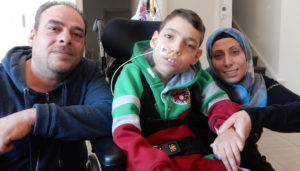A new lease on life for refugee family
For Syrian refugees Tawfik and Ghunwa Mira settling in Melbourne has not just given them safety and a chance to rebuild their lives, it has also given them back their son.
The couple’s 11-year-old boy Yousef suffers from cerebral palsy and epilepsy. For the first ten years of his life, Yousef was mostly asleep and largely unresponsive when he wasn’t.
Doctors in Syria advised the family to give Yousef sleeping pills.
And for the past four years the family has struggled to get medicines and treatment for Yousef; firstly because of the conflict in their home country and secondly because their status as refugees in Lebanon afforded them no access to free medical care.
“Yousef was asleep most of the time, he was lying down and not responsive at all. It was like I had a child but I didn’t have a child,” Ghunwa said.
Upon their arrival in Australia, Yousef spent a month as a patient at the Royal Children’s Hospital where his condition was stabilised and proper a treatment and therapy plan formulated.
 Now, after three-and-a-half months in Australia, his quality of life has improved significantly.
Now, after three-and-a-half months in Australia, his quality of life has improved significantly.
“The change is massive. Now Yousef can move his head and hands. He can hear voices and noises,” Ghunwa said.
“It’s very nice to see Yousef now, I never dreamed of seeing him strong and happy and more alert. His epilepsy episodes are much less,” she said.
“The staff at the Royal Children’s Hospital and the people from the refugee agency AMES have been fantastic. When we arrived Yousef was like a dead body, he could do nothing.
“Now, it’s as if he has entered our lives for the first time. It’s like we’ve got our son back.
“I feel like a mother for the first time and it is amazing that Yousef is attending Glenroy Special School five a days a week,” Ghunwa said.
This week the Mira family told of their epic journey from the war-torn streets of Aleppo to life in limbo as refugees in Lebanon and finally to a safe new home in Melbourne’s northern suburbs.
The family has survived one of the most brutal and bloody conflicts of recent times, they have endured life on the margins as refugees in a country that didn’t want them and they have overcome the tragedy of the death of their youngest son.
“Before the war Aleppo was a beautiful ancient city and also one of the biggest cities for industry in the Arab world,” Tawfik said this week.
“When the conflict between the Syrian army and the rebel armies started and the fighting came to our neighbourhood we had to leave,” he said.
The Mira family moved from one place to another to seek safety but every time they moved the fighting followed forcing Tawfik to give up his work as a stonemason.
“We had little food and no medicine for the children,” Tawfik said.
The Mira family lived for two years in an underground shelter as bombs rained down on the city outside.
“Because I has two disabled kids meant I didn’t go outside. Tawfik went out when we needed food,” Ghunwa said.
Then one day the family was told there was a way out; a dangerous two-day bus journey that would deliver them to safety in Lebanon.
“We took the bus. It was a dangerous trip but it was a way to escape the war. We had to carry the children,” Tawfik said.
But life in Lebanon was hardly any better for the family and they struggled to make ends meet living frugally in the small village of Mashtura.
“The way they treated us as refugees in Lebanon was very bad. They had the attitude that we were bad people,” Ghunwa said.
It was in Lebanon that they tragically they lost their other son, three-and-a-half year-old Ali who suffered from a condition similar to Yousef’s.
“Ali got sick and passed away. He had a chest infection but the doctors in Lebanon would not treat him because he was disabled,” Ghunwa said.
“They told me to take him home and let him die… and they wouldn’t let me bury him. They said you are not from Lebanon, you do not have a place here to bury him,” she said.
The family registered as refugees with the United Nations in Lebanon and were eventually offered a resettlement place in Australia.
But they almost didn’t make it. Just before they left, Yousef became ill and was taken to hospital.
He spent 15 days in in the clinic and the Lebanese health authorities refused to release him unless the family paid $US1500 for medical expenses.
Eventually the Australian Embassy paid the bill and the family were able to travel to Australia.
The Miras say they are happy and grateful to be in Australia and are keen to find work and contribute to the society that has given them a safe haven.
But their family and friends are scattered because of the war.
“We have no idea where many of them are,” Tawfik said.
“I have one brother in Turkey and another still in Lebanon and my mother is still in Syria. I worry about her,” he said.
Laurie Nowell
AMES Australia Senior Journalist












